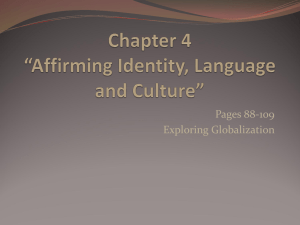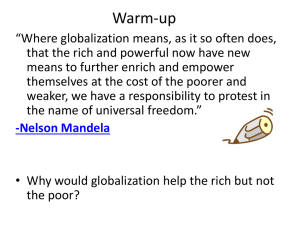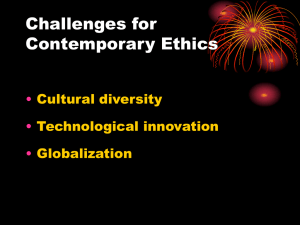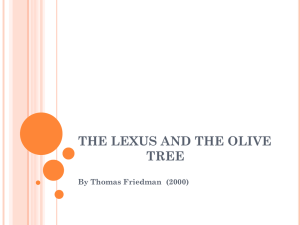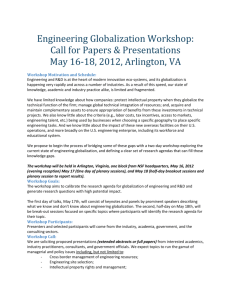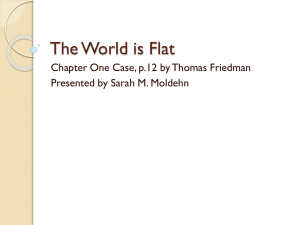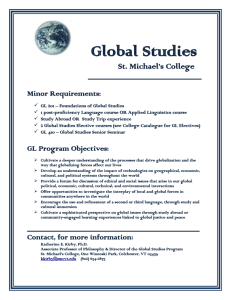docx - University of Colorado Boulder
advertisement
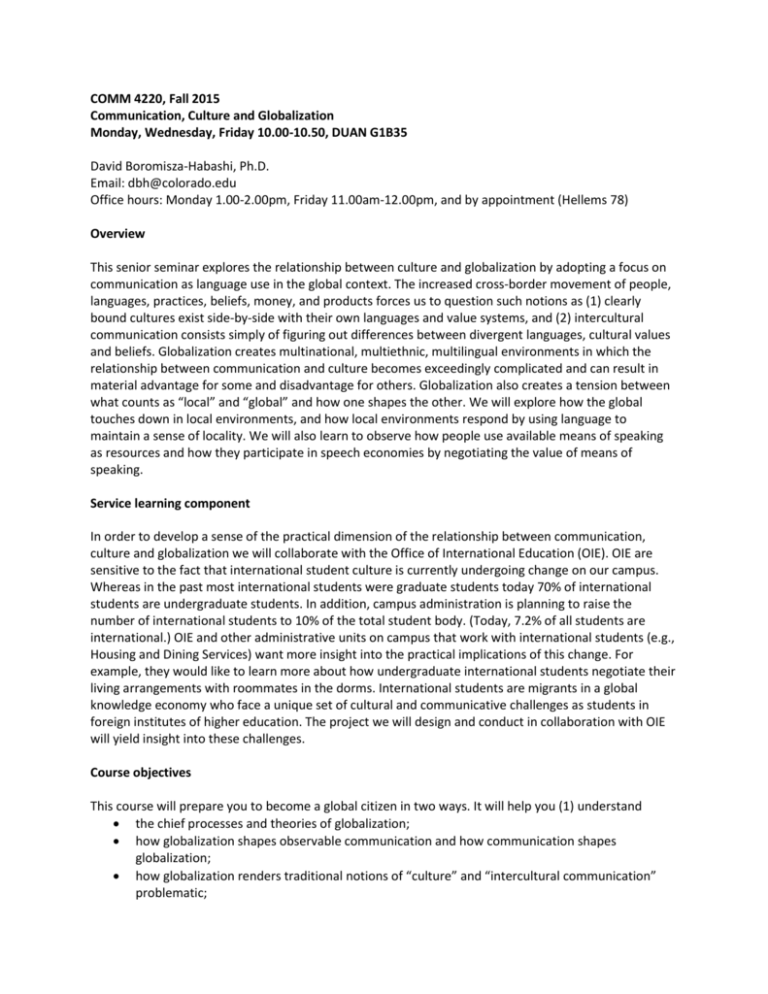
COMM 4220, Fall 2015
Communication, Culture and Globalization
Monday, Wednesday, Friday 10.00-10.50, DUAN G1B35
David Boromisza-Habashi, Ph.D.
Email: dbh@colorado.edu
Office hours: Monday 1.00-2.00pm, Friday 11.00am-12.00pm, and by appointment (Hellems 78)
Overview
This senior seminar explores the relationship between culture and globalization by adopting a focus on
communication as language use in the global context. The increased cross-border movement of people,
languages, practices, beliefs, money, and products forces us to question such notions as (1) clearly
bound cultures exist side-by-side with their own languages and value systems, and (2) intercultural
communication consists simply of figuring out differences between divergent languages, cultural values
and beliefs. Globalization creates multinational, multiethnic, multilingual environments in which the
relationship between communication and culture becomes exceedingly complicated and can result in
material advantage for some and disadvantage for others. Globalization also creates a tension between
what counts as “local” and “global” and how one shapes the other. We will explore how the global
touches down in local environments, and how local environments respond by using language to
maintain a sense of locality. We will also learn to observe how people use available means of speaking
as resources and how they participate in speech economies by negotiating the value of means of
speaking.
Service learning component
In order to develop a sense of the practical dimension of the relationship between communication,
culture and globalization we will collaborate with the Office of International Education (OIE). OIE are
sensitive to the fact that international student culture is currently undergoing change on our campus.
Whereas in the past most international students were graduate students today 70% of international
students are undergraduate students. In addition, campus administration is planning to raise the
number of international students to 10% of the total student body. (Today, 7.2% of all students are
international.) OIE and other administrative units on campus that work with international students (e.g.,
Housing and Dining Services) want more insight into the practical implications of this change. For
example, they would like to learn more about how undergraduate international students negotiate their
living arrangements with roommates in the dorms. International students are migrants in a global
knowledge economy who face a unique set of cultural and communicative challenges as students in
foreign institutes of higher education. The project we will design and conduct in collaboration with OIE
will yield insight into these challenges.
Course objectives
This course will prepare you to become a global citizen in two ways. It will help you (1) understand
the chief processes and theories of globalization;
how globalization shapes observable communication and how communication shapes
globalization;
how globalization renders traditional notions of “culture” and “intercultural communication”
problematic;
linguistic and social inequality in the context of globalization; and
the complicated relationship between local and global ways of speaking.
The course will also prepare you to (2) collect and interpret evidence of the interaction between
communication, culture and globalization.
D2L and email
To access the course website, go to learn.colorado.edu. Your D2L login is your CU login name (the same
one you use for your email account). Your password is your Identikey. If you don’t know your CU login
name, then you should contact (303) 735-HELP (or 5-4357) from a campus phone or you can email
help@colorado.edu. All of your writing assignments will be due on D2L.
Outside class, the primary mode of communication between you and me will be email. Please make sure
your email account (i.e., the one listed in the CU system) is in good working order, and let me know if
you are not receiving course-related emails from me.
Course readings
There are two required readings for this course, both of which are available in the campus bookstore:
[ICCI] Piller, I. (2011). Intercultural communication: A critical introduction. Edinburgh, UK: Edinburgh
University Press.
[GVSI] Steger, M. (2013). Globalization: A very short introduction. Oxford, UK: Oxford University Press.
I will make all other readings available to you on D2L.
Bevis, T.B., & Lucas, S.J. (2007). International students in American colleges and universities: A history.
New York, NY: Palgrave Macmillan. (Chapters 8 & 9)
Blommaert, J. (2010). The sociolinguistics of globalization. Cambridge, UK: Cambridge University Press.
(Chapter 3)
Hegarty, N. (2014). Where we are now: The presence and importance of international students to
universities in the United States. Journal of International Students, 4(3), 223-235. Retrieved from
https://jistudents.files.wordpress.com/2014/03/2014-4-3-2-where-we-are-now.pdf
Hymes, D. (1974). Ways of speaking. In R. Bauman, & J. Sherzer (Eds.), Explorations in the ethnography
of speaking (pp. 433-451). Cambridge, UK: Cambridge University Press.
Pandit, K. (2013). International students and diversity: challenges and opportunities for campus
internationalization. In H.C. Alberts, & H.D. Hazen (Eds.), International students and scholars in the
United States: Coming from abroad (pp. 131-144). New York, NY: Palgrave Macmillen.
Pennycook, A., & Mitchell, T. (2008). Hip hop as dusty foot philosophy: Engaging locality. In H.S. Alim, A.
Ibrahim, & A. Pennycook (Eds.), Global linguistic flows: Hip hop cultures, youth identities, and the
politics of language (pp. 25-42). New York, NY: Routledge.
Rahman, T. (2009). Language ideology, identity and the commodification of language in the call centers
of Pakistan. Language in Society, 38(2), 233-258. doi:10.1017/S0047404509090344
Turner, B.S. (2011). Theories of globalization: Issues and origins. In B.S. Turner (Ed.), The Routledge
international handbook of globalization studies (pp. 3-22). New York, NY: Routledge.
Witteborn, S. (2010). The role of transnational NGOs in promoting global citizenship and globalizing
communication practices. Language and Intercultural Communication, 10(4), 358-372.
doi:10.1080/14708477.2010.497556
Evaluation
Participation (5%). I will not be taking attendance in this class – therefore your attendance will not
factor into your participation score. I consider you an adult who makes their own choices about how
best to spend their time. The only days when I do require your attendance are those when you are
scheduled to give a presentation and when there is an exam. Having said that, I will point out that I work
best in a class where people are consistently present and involved with the course content. Being
“involved” means being physically and mentally present in class, having and using the text and other
required materials, completing assigned readings before they are discussed, turning in assignments on
time, and participating in classroom discussions and activities. To put it bluntly, your involvement will
ensure that I will remember you and your contribution to the course at the end of the semester. I also
want you to talk with me about potential absences before they happen, to use discretion, sensitivity,
and respect in class discussions, and to do your own work. At the end of the course, I will subjectively
evaluate your participation based on the above criteria.
You also have the right to have expectations of me, and I will do my best to honor them. I assume that
you expect me to show up on time for class, be prepared, respect you and your efforts, communicate
my grading standards clearly, return your work promptly, grade fairly, and maintain scheduled office
hours. If you have other expectations of me, please let me know. I will use the TeachBack app
throughout the semester to collect feedback from you about various aspects of the course. iOS and
Android versions of the app are both available for free.
Self-reflection essay (5%). In this essay, you will discuss a particular example from your daily life that
you believe has something to do with communication and globalization. You will answer questions
about the significance of this example, your personal interest in globalization, and your personal goals
for this course.
Reading quizzes (total of 4) (20%). These quizzes will be designed to test your familiarity with the
readings we will have covered since the beginning of the semester or the previous reading quiz.
Indexing the global and the local (15% essay). This assignment will ask you to search in and around
Boulder for public displays (advertising, shop windows, public spaces) that use language and/or images
to index the global with relation to the local or vice versa. You will provide approximately 10 pictures
and draw on course materials to discuss how these displays create a sense of place in a global context.
International student communication profile (10 % essay + 5% presentation). For this assignment, you
will create a communication profile for an international student you will interview. The contents of this
profile will depend on the questions our “client,” the Office of International Education, will ask us to
address. You will draw on scholarly literature to highlight communication problems particular to
international students, and critique what you read based on what you find in constructing your
communication profile.
Recommendations for intervention (5%). Based on the communication profiles you and your peers will
create you will write a brief essay with recommendations for alleviating the communication challenges
international students on our campus face.
Both the midterm exam (15%) and the final exam (20%) will feature short essay questions.
Grade breakdown
A
AB+
B
BC+
C
CD+
D
DF
94-100
90-93
87-89
83-86
80-82
77-79
73-76
70-72
67-69
63-66
60-62
59 and below
Tentative course schedule
Week
Week 1
8/24
Week 2
8/31
Week 3
9/7
Week 4
9/14
Week 5
9/21
Week 6
9/28
Week 7
10/5
Week 8
10/12
Week 9
10/19
Week 10
10/26
Week 11
11/2
Week 12
11/9
Week 13
11/16
Week 14
11/23
Topic
Introduction to globalization 1.
Reading
GVSI Chs 1-4
Assignments
Introduction to globalization 2.
GVSI Chs 5-8
Self-reflection essay due 9/4
Theories of globalization
Turner
Reading quiz 1 9/11
Speech economies
Hymes
“Culture”
ICCI Chs 1-2
“Intercultural communication”
ICCI Chs 3-4
Contexts of culture: nation,
work
Contexts of culture: marketing,
romance
Culture: who is in, who is out?
ICCI Chs 5-6
Local vs. global: call centers,
hip hop
Local vs. global: education,
NGOs
International students in the
US: recent history
International students in the
US: opportunities, challenges
Fall break
Rahman, Pennycook
& Mitchell
Blommaert,
Witteborn
Bevis & Lucas
ICCI Chs 7-8
Reading quiz 2 10/2
Midterm 10/16
ICCI Chs 9-10
Hegarty, Pandit
Reading quiz 3 11/6
Indexing the global and the local
essay due 11/13
Reading quiz 4 11/20
Week 15
11/30
Week 16
12/7
Final
International student
communication profiles:
presentations
International student
communication profiles:
synthesis, recommendations
Review for final
December 16
Communication profiles due on
the day of your presentation
Recommendations for
intervention due 12/9
Course policies
(The web links featured in the text below are live in the online version of this syllabus on D2L.)
Accommodation for disabilities
If you qualify for accommodations because of a disability, please submit to your professor a letter from
Disability Services in a timely manner (for exam accommodations provide your letter at least one week
prior to the exam) so that your needs can be addressed. Disability Services determines accommodations
based on documented disabilities. Contact Disability Services at 303-492-8671 or by e-mail at
dsinfo@colorado.edu. If you have a temporary medical condition or injury, see Temporary Injuries
guidelines under the Quick Links at the Disability Services website and discuss your needs with your
professor.
Religious observance
Campus policy regarding religious observances requires that faculty make every effort to deal
reasonably and fairly with all students who, because of religious obligations, have conflicts with
scheduled exams, assignments or required attendance. In this class, {{insert your procedures here}}
See campus policy regarding religious observances for full details.
Classroom behavior
Students and faculty each have responsibility for maintaining an appropriate learning environment.
Those who fail to adhere to such behavioral standards may be subject to discipline. Professional
courtesy and sensitivity are especially important with respect to individuals and topics dealing with
differences of race, color, culture, religion, creed, politics, veteran’s status, sexual orientation, gender,
gender identity and gender expression, age, disability, and nationalities. Class rosters are provided to
the instructor with the student's legal name. I will gladly honor your request to address you by an
alternate name or gender pronoun. Please advise me of this preference early in the semester so that I
may make appropriate changes to my records. For more information, see the policies on classroom
behavior and the student code.
Discrimination and Harassment
The University of Colorado Boulder (CU-Boulder) is committed to maintaining a positive learning,
working, and living environment. CU-Boulder will not tolerate acts of discrimination or harassment
based upon Protected Classes or related retaliation against or by any employee or student. For purposes
of this CU-Boulder policy, "Protected Classes" refers to race, color, national origin, sex, pregnancy, age,
disability, creed, religion, sexual orientation, gender identity, gender expression, veteran status, political
affiliation or political philosophy. Individuals who believe they have been discriminated against should
contact the Office of Institutional Equity and Compliance (OIEC) at 303-492-2127 or the Office of
Student Conduct and Conflict Resolution (OSC) at 303-492-5550. Information about the OIEC, the above
referenced policies, and the campus resources available to assist individuals regarding discrimination or
harassment can be found at the OIEC website. The full policy on discrimination and harassment contains
additional information.
Honor Code
All students of the University of Colorado at Boulder are responsible for knowing and adhering to the
academic integrity policy of this institution. Violations of this policy may include: cheating, plagiarism,
aid of academic dishonesty, fabrication, lying, bribery, and threatening behavior. All incidents of
academic misconduct shall be reported to the Honor Code Council (honor@colorado.edu; 303-7352273). Students who are found to be in violation of the academic integrity policy will be subject to both
academic sanctions from the faculty member and non-academic sanctions (including but not limited to
university probation, suspension, or expulsion). Additional information regarding the Honor Code policy
can be found online and at the Honor Code Office.



